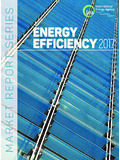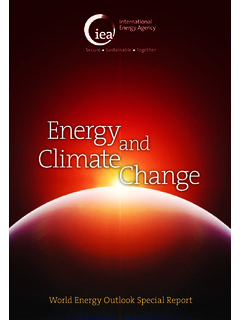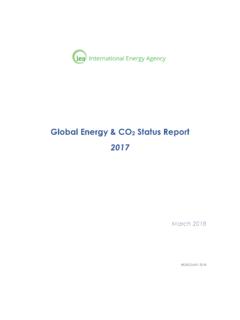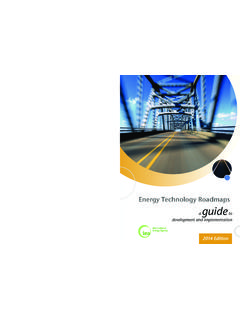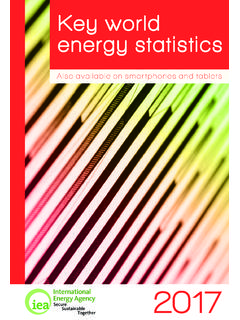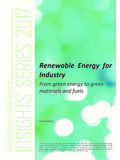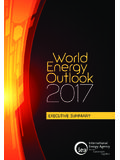Transcription of Energy Matters - International Energy Agency
1 1 Take five key actions, led by Energy efficiency and renewables, to peak then reduce global Energy emissions2 Use the Paris agreement to drive short-term actions consistent with long-term emission goals3 Accelerate Energy technology innovation to make decarbonisation easier and even more affordable4 Enhance Energy security by making the Energy sector more resilient to climate change impactsEnergy MattersHow COP21 can shift the Energy sector onto a low-carbon path that supports economic growth and Energy access2 IEA Ministerial Statement on Energy and Climate Change18 November 2015 Energy production and use account for around two-thirds of global greenhouse gas (GHG) emissions, meaning that actions in the Energy sector are crucial to addressing our shared climate change challenge. Moreover, access to Energy is a precondition for economic and social development, highlighting the need to eliminate Energy poverty.
2 We, the ministers with responsibility for Energy attending the International Energy Agency (IEA) 2015 Ministerial meeting, recognise that a transformation of the world s Energy system is essential and must be a uniting vision if our common climate change, development, economic, and Energy security goals are to be note that the transformation to a safe and sustainable low-carbon Energy system is underway, with the IEA reporting that: Renewables accounted for nearly half of the growth in global electricity generation capacity in 2014, as supportive policies and rapidly declining costs, such as for solar photovoltaics, helped to deliver a record-high 130 gigawatts of new capacity around the world. Energy efficiency regulations now cover 27% of the world s Energy consumption (up from 12% in 2005). The rise of distributed generation, smart grids and storage technologies are rapidly changing the way Energy is supplied and ministers have a central role in facilitating and accelerating these developments.
3 This includes policies that enable economically feasible solutions at scale, substantially accelerating technological innovation, employing a wide diversity of clean, safe and sustainable Energy solutions, and fully leveraging the financial assets and deployment capabilities of the private recognise that, according to science, deep cuts in global GHG emissions are required to hold the increase in global average temperature below two degrees Celsius (2 C) above pre-industrial levels. Safe and sustainable low-carbon technologies and Energy efficiency play a critical role in promoting Energy security. We take special note of the important opportunity that the 21st Conference of the Parties of the United Nations Framework Convention on Climate Change (COP21), in December 2015, offers all countries to set in motion an ambitious cycle of increasing climate and clean Energy action over time, supported by mutual confidence and co-operation, and a robust International framework.
4 We emphasise the need to explicitly recognise and signal for COP21 that an Energy transformation is necessary if our climate goals are to be achieved and that the transformation is underway. We will continue to support our respective negotiators to successfully conclude an ambitious highlight that many countries, including all IEA member countries, have submitted intended nationally determined contributions (INDCs) ahead of COP21 and are committed to ensuring their full implementation. We welcome the positive influence that these INDCs will have on future Energy sector trends, and we endorse the conclusion of IEA analysis that they should be seen as a first step upon which to take regular further steps that build ever-increasing commend the IEA for its work supporting the Energy transformation to a safe and sustainable low-carbon Energy system.
5 We acknowledge that global Energy markets continue to change and that the IEA has a leadership role in encouraging major Energy consumers and producers to 3participate in the transformation of the world s Energy system in a flexible and inclusive manner. We welcome, in particular, the five key opportunities* recommended to reduce GHG emissions from the Energy sector, while maintaining the economic and sustainable development prospects of all regions. These are:1. Increasing Energy efficiency in the industry, buildings and transport Phasing-out the use of the least-efficient coal-fired power Increasing investment in renewable Energy technologies (including hydropower) over time, reaching at least $400 billion in Gradual phasing out of inefficient fossil-fuel subsidies to Reducing methane emissions from oil and gas production.
6 * World Energy Outlook 2015 Special Report on Energy and Climate ChangeBy acting on these opportunities, we could reduce the inefficient use of Energy and bring forward the necessary decline in global Energy -related emissions. We agree to consider these recommendations when setting our own Energy and climate strategies, and we encourage other countries to do so as also recognise that there is an imperative to accelerate widespread innovation in a full range of safe and sustainable clean and more efficient Energy technologies, as central to transforming the world s Energy system. Accelerating innovation is vital to meet our shared, long-term climate goals; for affordable and reliable Energy for everyone; and to further promote Energy security. We acknowledge the contribution of technological innovation to fostering economic growth and the need to incentivise investments in safe and sustainable low-carbon Energy technologies, using a range of available policy options such as policies to support research, development, and demonstration (RD&D) and carbon countries have a vital role in helping to develop new, breakthrough technologies and helping to enable emerging Energy technologies to become technically and commercially viable.
7 We recognise the important role of the private and public sectors in making the investments and developing the technologies and good practices needed to reduce costs and further progress towards a more clean, efficient and sustainable Energy system. To this end, we believe the IEA Implementing Agreements Energy technology network can play a stronger role in bringing together experts from governments and industry to carry out mutually beneficial programmes and projects on Energy technology RD& also call upon the IEA to continue to provide recommendations for enhancing the economic and environmental sustainability of the Energy sector, including recommendations to reduce local pollution. To support this, we encourage the IEA to expand its efforts in tracking Energy -sector transformation ( through holistic, long-term Energy planning analysis) and to increase International collaboration in this area.
8 This must all be supported by high-quality Energy urgently and fully taking advantage of all of these opportunities, we can build momentum towards a transformed global Energy system that achieves our common climate change, development, economic, and Energy security at the heart of the climate challengeEnergy drives economic growth and social development around the world. It also accounts for around two-thirds of global greenhouse gas (GHG) emissions, and so lies at the heart of the climate change challenge. Decision makers gathering in Paris for COP21 must therefore build a climate agreement that makes Energy a central part of the solution, shifting operations and investments onto a low-carbon path that continues to support economic growth and must shift the Energy sector onto a low-carbon path that continues to support economic growth and developmentThere are hopeful signs.
9 Although the world economy grew by 3% in 2014, emissions of carbon dioxide (CO2) from the Energy sector did not rise. Progress in Energy efficiency and increasingly affordable renewable Energy are building momentum for change and instilling confidence that low-carbon Energy systems are realistic. We are also seeing truly global engagement on climate change: as of mid-November, over 160 countries representing over 90% of both global Energy -related emissions and global population had submitted Intended Nationally Determined Contributions (INDCs) in anticipation of COP21. Implementation of these INDCs would result in the rate of improvement in Energy use per unit of economic output improving by nearly three-fold, and would lead power sector emissions to plateau at close to today s levels (Figure).
10 But time is running short. Actions taken so far are only the first step towards the deeper systemic changes needed to truly decouple continued economic growth and development from emissions. Although the INDCs will slow emissions growth, a peak and subsequent reduction in emissions must occur. More effort will be needed to build on these initial IEA stands ready to support the transformational change of Energy systems that is required to meet climate goals; it will bring together data, modelling, policy and technology analyses to meet the practical needs of countries as they embark on this historic transition. This document presents the IEA s key messages to Take five key actions, led by Energy efficiency and renewables, to peak then reduce global Energy emissionsThe INDCs are a leap forward in the breadth and depth of climate response, but more is needed.
